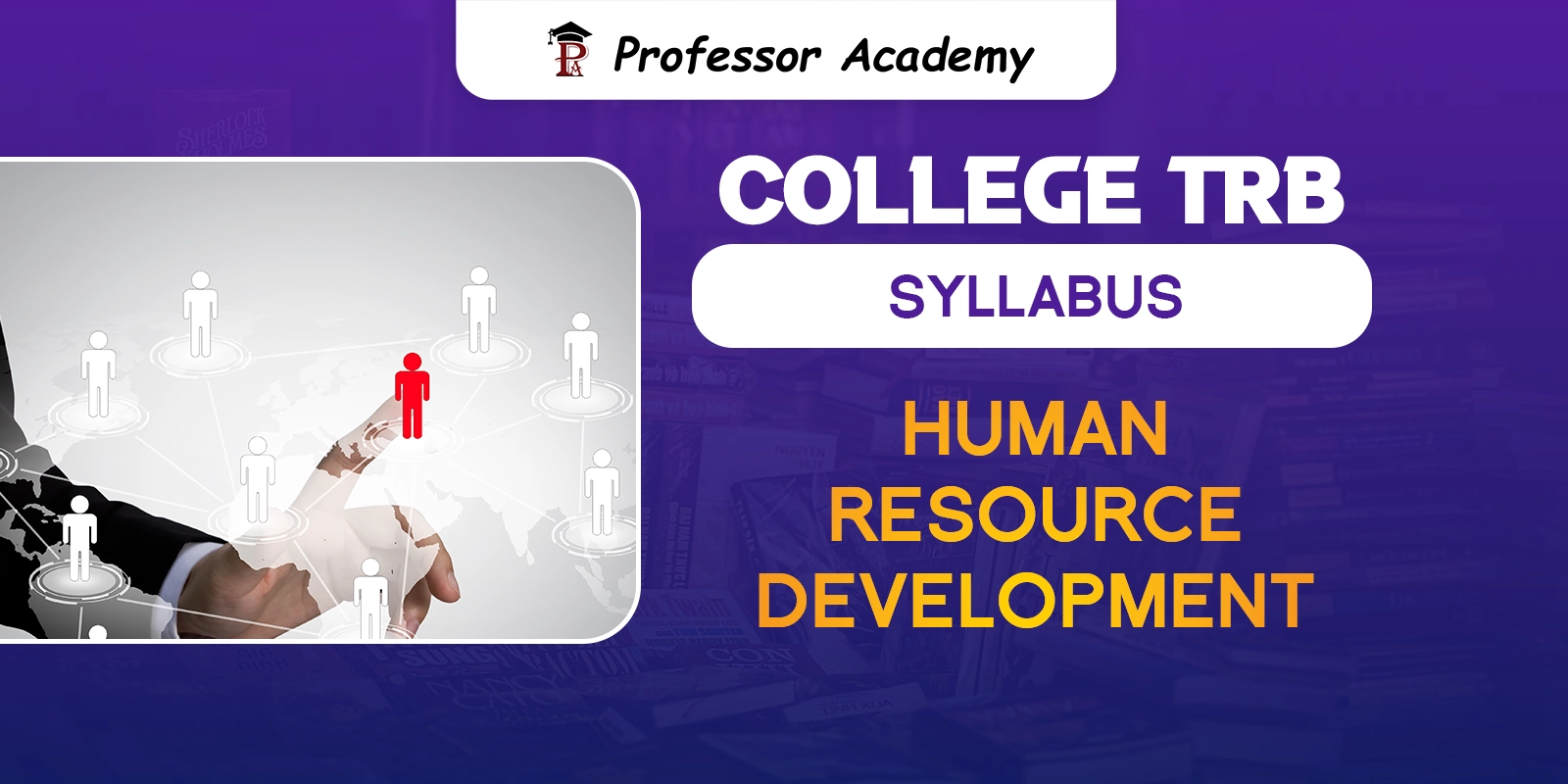Introduction
The TN TRB Assistant Professor Human Resource Development (HRD) Syllabus offers a comprehensive framework for candidates preparing for the Tamil Nadu Teachers Recruitment Board (TRB) examination in Human Resource Development. The syllabus includes essential areas such as organizational behavior, training and development, performance management, labor laws, employee relations, and talent management. It also highlights modern HR practices, including digital HR, leadership development, and organizational learning. This structured syllabus helps aspirants build a strong understanding of how to develop human potential and manage workforce effectiveness in educational and corporate environments.
TN TRB Assistant Professor Syllabus – HUMAN RESOURCE DEVELOPMENT (HRD)
Unit–1 Principles and Practices of Management:
Evolution of management Thought, Contributions of Taylor, Fayol, Mayo, Mary Parker Follett and C.I. Barnard – various approaches to management- Behavioural Approach, Systems Approach, Quantitative Approach and Contingency Approach. Function of Management: Planning and Decision Making, Organising, Staffing, Directing, Controlling, Coordinating.
Unit–2 Human Resource Management and IHRM:
Concept, functions and scope of HRM. Human Resource Planning, Job Analysis, Recruitment, Selection, Placement, Induction, Training and Development, Performance Management, Job Evaluation, Compensation Management, Employee Benefits and Incentives. Organisational context of IHRM, IHRM and Sustainable Business, Functions of IHRM, Cross–Cultural Studies, Cultural Diversity, Transnational Organisations, IHRM models.
Unit–3 Organisational Behaviour:
Concept, Scope, Nature of human behavior, Personality, Perception, Learning, Attitude, Motivation, Interpersonal Behaviour, Group Dynamics, Leadership qualities and theories, team building and team effectiveness. Power and Authority, Stress, Organisational Change and transactional analysis.
Unit–4 Industrial Relations:
Concept, Scope, causes for poor industrial relations, industrial relations machinery – joint consultation, works committee, conciliation, adjudication, attribution, grievance procedure, code of conduct and collective bargaining. Workers Participation in Management (WPM) Trade Unions–Concepts, Role and Evolution, Problems of trade unions in India. International labour movement. Trade Union Act 1926.
Unit–5 Labour Legislation and industrial disputes:
Classification and Evolution of International Labour Organisation, Social Justice and Labour Legislation in India–Indian Constitution and Labour Laws. The Factories Act, 1948. The Mines Act, 1952. The Inter-state Migrant Workmen (Regulation of employment and conditions of service) Act, 1979. The Contract Labour (Regulation and Abolition) Act, 1970. The Building and other Construction workers (Regulation of employment and conditions of service) Act, 1996. The Child Labour (Prohibition and Regulation) Act, 1986. The Industrial Employment Act, 1946- Factors and forms of disputes- Central and State Labour Administration- strikes and lockouts. Industrial Dispute Act 1947
Unit–6 Wages:
Concept, Types, Factors influencing wages, Wage Theories and Wage Differentials, wage components ,wage criteria and machinery-The Minimum Wages Act-1948. The Payment of Wages Act, 1936–The Payment of Bonus Act, 1965–The Equal Remuneration Act, 1976–The Payment of Gratuity Act, 1972–The Employees’ Provident Fund and Miscellaneous Provisions Act, 1952.
Unit–7 Labour Welfare and Compensation:
Concept, Scope, Types of labor welfare–Theories and Principles–Employee safety program and its measures in organization–Industrial Health and Hygiene, Industrial Accidents and safety, Occupational Diseases–Social Security–counseling and mental health–Concept and Scope, Social assistance and Social assurance and other fringe benefits .
Unit – 8 Labour Economics:
Concept and evolution of labour Economics–Demand and Supply of Labour, Nature and Composition of Indian Labour Force, Unemployment and Underemployment, Types of Labour Market, Characteristics of Indian Labour Market, Emerging trends in mobility, migration and efficiency–New Dynamics of Labour Market in India, Economic Systems and Labor Market, Problems of Labour in India.
Unit 9 Human resource Development
concept, mechanism, process and outcomes. HRD intervention–HRD audit–HRD culture and climate–Career management -competency mapping–new trends in HRD. Consultant, client relationship. Knowledge management and Human Resource Information System.
Unit 10 Organisational Development –
Concept and process, assumptions and values underlying OD. OD interventions– change agents–trends in OD–foundations of OD – emergence of OD as an applied behavioural science – challenges and future of OD.
Download TN TRB Assistant Professor Syllabus – HUMAN RESOURCE DEVELOPMENT (HRD): https://professoracademy.com/wp-content/uploads/2025/10/HUMAN-RESOURCE-DEVELOPMENT-HRD-SYLLABUS-1.pdf
Join our College TRB Tamil Eligibility & Descriptive Paper Coaching: https://professoracademy.com/courses/tn-trb-assistant-professor-tamil-eligibility-paper-2-only/
Join Our College TRB Coaching: https://professoracademy.com/product-category/college-trb
Conclusion
The Human Resource Development syllabus for the TN TRB Assistant Professor exam serves as a valuable guide for individuals aspiring to teach or research in the field of human resource management and development. By integrating theoretical principles with practical approaches, the syllabus enhances the candidate’s analytical, managerial, and interpersonal skills. Preparing according to this syllabus enables aspirants to perform well in the examination and contribute effectively to the advancement of HR education and professional training.
For more information!
Contact Us : +91 7070701005 / +91 7070701009 / +91 8124408794 / +91 7550100920


